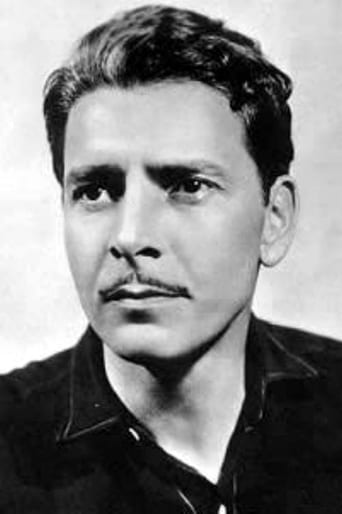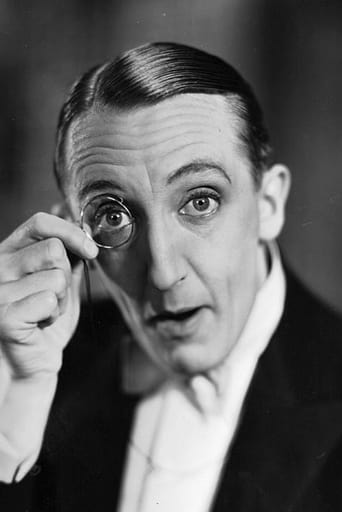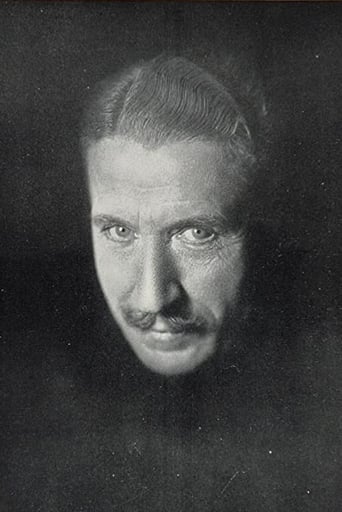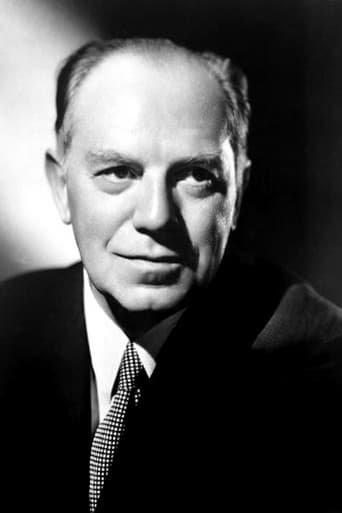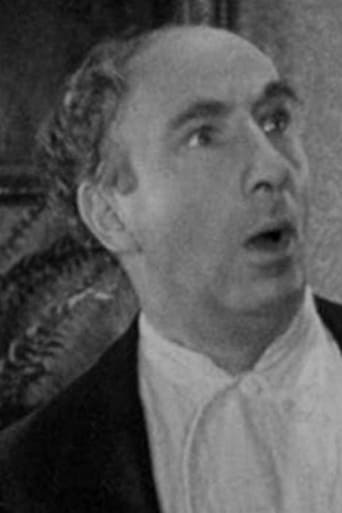robertguttman
Bulldog Drummond was already a famous action/adventure hero by 1929, when this movie was produced. Nevertheless, it is obvious from the first scene that this movie was made with tongue firmly in cheek. Everything is presented in a manner so over-the-top, so heavy-handed, particularly the melodramatic aspects of the story, that it is clear that this film was meant to be as much a comedy as an action/adventure melodrama. It takes a deft hand to pull off the trick of presenting melodrama as comedy without looking foolish. In this case, the cast of able professionals is headed by two stars who would fo on to achieve legendary film careers: Ronald Coleman and a 19-year-old Joan Bennet. This movie was produced before Ms. Bennet changed her hair color from blond to black, so some film buffs might not recognizer her immediately. The change differentiated her from her equally-famous blond sister, Constance. However, it apparently also helped her to get more substantial roles. Joan Bennet would end up having one of the longest careers in film history, appearing in 98 productions over a period of well in excess of 60 years. Bulldog Drummond is an old-fashioned action adventure/melodrama. However, if viewed from the correct perspective, it is also quite funny. It is patently evident that was the perspective from which the filmmakers intended the film to be viewed.
Prismark10
Ronald Coleman stars in this early talkie from 1929 which now appears to be rather creaky, not helped that some of the actors appear to be making a difficult transition to talking pictures.Not so with Ronald Coleman he seems to have stepped up with ease as the dashing hero, Captain Hugh Drummond a retired army officer who places a personal ad in the Times newspaper advertising his services. A young lady Phyllis (Joan Bennett) responds as her wealthy American uncle is being held captive in a Nursing Home by a gang which consists of a mad doctor and his cohorts who are after the uncle's money.Drummond is assisted by his valet and the annoying as well as dim friend Algy (Claude Allister.)This is a rather stagy film being adapted from a play and it also comes across as rather starchy.
preppy-3
VERY early talkie from 1929. It stars Ronald Colman as a wealthy WW1 veteran--Hugh "Bulldog" Drummond. He sets out to help people in trouble. He gets a letter from the mysterious Phyllis (Joan Bennett) who believes her father is being held against his will and tortured in a nursing home. She wants Bulldog to rescue him. He agrees and is helped by his faithful valet and annoying best friend Algy (Claud Allister).Most early talkies are boring stiff affairs but not this one. It moves quickly, is lots of fun, has exciting action sequences and has a great Oscar-nominated performance by Colman. The sound recording is good and the video is as good as can be expected from a 1929 film. The only negative about this is Allister as Algy. He plays his role WAY over the top and comes across as annoying and unfunny. Halfway through I wanted that guy gone! Him aside though this is an enjoyable and fun early talkie.
theowinthrop
When the first "Bulldog Drummond" stories came out in the 1920s, Great Britain was trying to come to grips with an anomaly: it had been one of the main allied victors in the Great War but the country did not feel like it won anything. It felt it had sacrificed too much.Britain in 1914 had ruled the waves. It had a small (but apparently competent) standing army. It had a history of democracy that was stable and unmatched by any of the major continental powers of Europe. It had a very highly industrial economy and was commercially quite important on the globe. Finally, it's empire stretched around the world that the boast that "the sun never set on the British Empire" was true - it was also the world's largest empire.In truth Britain's empire was actually wearing away. Though the British technically won the Boer War Boer Leaders ended up running South Africa. Ireland was getting hotter. The Germans helped stimulate the Easter Rebellion with arms. The British Navy did control the seas but the u-boats almost beat Britain during the war. The naval battles were marred by a total German triumph under Von Spee in the Pacific (Coronel)and the lopsided British ship and men losses at their "victory" at Jutland. Finally, Germany and the U.S. had outstripped British commerce and industrial output by 1914. With the huge losses of a generation of men, and no tangible gains, Britain was in for a serious period of reactionary feelings and even race baiting. Anti-Semitism (always under the surface) reemerged in the 1920s, mostly due to the rise of Bolshevism in Russia after the 1917 revolutions. The political landscape did not reduce this hysteria. Lloyd George was booted out of the Prime Minister's seat forever in 1922. His successor, Andrew Bonar Law, died after nine months in office. Stanley Baldwin was not fully ready to be Prime Minister in 1923, and would blow his administration by a public hissy fit. His rival, James Ramsay MacDonald, would be the first Labor Prime Minister. But he'd been an outspoken pacifist in the war, and he was suspect of Bolshevistic sympathies (he actually had none). In the 1924 General Election a forged letter (supposedly from Gregory Zinovieff, the head of the Russian Comintern) urged MacDonald's election as an agent of the Russians. Baldwin regained office with a large majority.It is this background that explains the popularity of "Bulldog Drummond". With governmental drift and doldrums, a declining economy, a feeling of loss of face on the international scene, and a feeling of loss due to immense death toll, the search for easy answers, easy suspects, easy enemies was ready for Sapper's poison. So the public cheered Col. Hugh "Bulldog" Drummond as he created a fascistic group of ex soldiers (like the German Freikorps) to "control" the internal enemy (i.e., Bolsheviks, Jews, Irish). I might add this was not totally made up. Lloyd George gave the go ahead while Prime Minister to create a paramilitary group in Ireland, the "Black and Tans", to combat the Irish revolutionaries. This group was finally decimated by Michael Collins' men on "Bloody Sunday" in 1921.That Samuel Goldwyn, a Jewish American film producer, produced BULLDOG DRUMMOND, is highly ironic. But it illustrates the care Goldwyn brought to his projects. He had been producing the silent film hits that Ronald Colman appeared in in the late 1920s. Goldwyn wanted Colman to make the transition to sound carefully, and not fall on his face like Colman's rival John Gilbert. Instead of "Darling, I love you!" in HIS GLORIOUS NIGHT, Goldwyn found an exciting adventure part for Colman, which allowed him to display his wonderful, gentleman's speaking voice. As an introduction for a talking Colman, BULLDOG DRUMMOND could not be beaten. The role had everything to show Colman's versatility. There was his humor, shown at the beginning when he is dismayed at the ridiculously boring men's club he belongs to (full of old fogies). There was his romantic side, with the youthful Joan Bennett. There is his confrontations with the sinister Lawrence Grant (Dr. Lakington) and Grant's two assistants Montague Love and Lilyan Tashman (Carl Peterson and Irma), and his handling of his impossibly stupid friend Algy (Claude Allister). As a "coming out" role for talkies, BULLDOG DRUMMOND did the trick, winning Colman the audience he feared talking films would cost him.In terms of plot it creaks, with incredible coincidences and twists that allow plot points to fall apart for the creation of new plot points. Still the cast is game, and the script surprises us. Lakington, briefly having Drummond tied up, is speaking to him pretty closely. Colman turns his face from Grant, who accuses him of being more cowardly than he'd admit. Colman rejects this excuse. Then why turn your face away, demands Grant. "Haven't your best friends told you?", says Colman, leaving Grant turning crimson at the thought of halitosis. A later bit of business, allowing Love and Tashman to escape is also unexpected. Yes, it is an antique, but it is a charming one. And as it has none of Sapper's racist crap in it, it is highly recommended.
